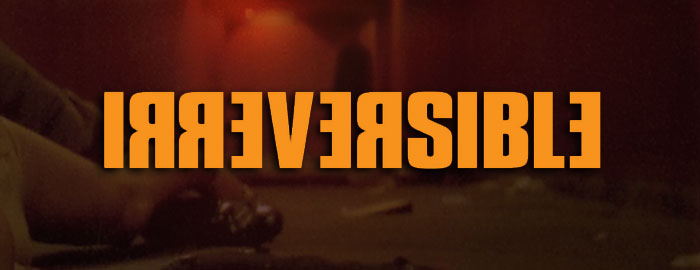
Color, 2002, 97 mins. 26 secs. / 89 mins. 34 secs.
Directed by Gaspar Noé
Starring Monica Bellucci, Vincent Cassel, Albert Dupontel, Jo Prestia
Altered Innocence (Blu-ray) (US RA HD), Indicator (Blu-ray) (UK RB HD), Lionsgate (DVD) (US R1 NTSC), Accent (DVD) (Australia R4 PAL), Studiocanal (Blu-ray & DVD) (Germany, France RB/R2 PAL), Tartan (DVD) (US R2 PAL) / WS (2.35:1) (16:9)
A  regular high-ranking title on lists of the most disturbing films
regular high-ranking title on lists of the most disturbing films  ever made, this confrontational and absolutely unforgettable sensory experience put French director Gaspar Noé on the map as an international force to be reckoned with after his grim and still underseen 1998 debut, I Stand Alone. Opening with a direct nod to that prior film before plunging into a swirling nightmare and deeply-felt tragedy, the production is most notorious for two lengthy, hard-to-watch sequences in its first half but is also an extremely well-acted (largely improvised) and potent look at a relationship torn to shreds in less than 24 hours. Noé has gone on to make several deeply divisive and highly effective films including the aesthetic follow-up Into the Void, the 3-D bodily fluid extravaganza Love, and his most easily digestible film, Climax, but this may still be his masterpiece.
ever made, this confrontational and absolutely unforgettable sensory experience put French director Gaspar Noé on the map as an international force to be reckoned with after his grim and still underseen 1998 debut, I Stand Alone. Opening with a direct nod to that prior film before plunging into a swirling nightmare and deeply-felt tragedy, the production is most notorious for two lengthy, hard-to-watch sequences in its first half but is also an extremely well-acted (largely improvised) and potent look at a relationship torn to shreds in less than 24 hours. Noé has gone on to make several deeply divisive and highly effective films including the aesthetic follow-up Into the Void, the 3-D bodily fluid extravaganza Love, and his most easily digestible film, Climax, but this may still be his masterpiece.
In the dead of night, Marcus (Cassel) is wheeled out on a stretcher from a seedy sex club while his best friend, Pierre (Dupontel), is escorted under arrest by the police. Through a sequence of unbroken takes that each leap further back in time, we see how they invaded the club looking for a pimp named Le Tenia (Prestia) only to find themselves in way over their heads in an escalation to an unspeakably gruesome act of violence. Their quest for revenge turns out to be tied to Marcus' girlfriend, Alex (Bellucci), who was victim to a heinous assault in a subway station earlier that evening following a party that left her departing by herself. 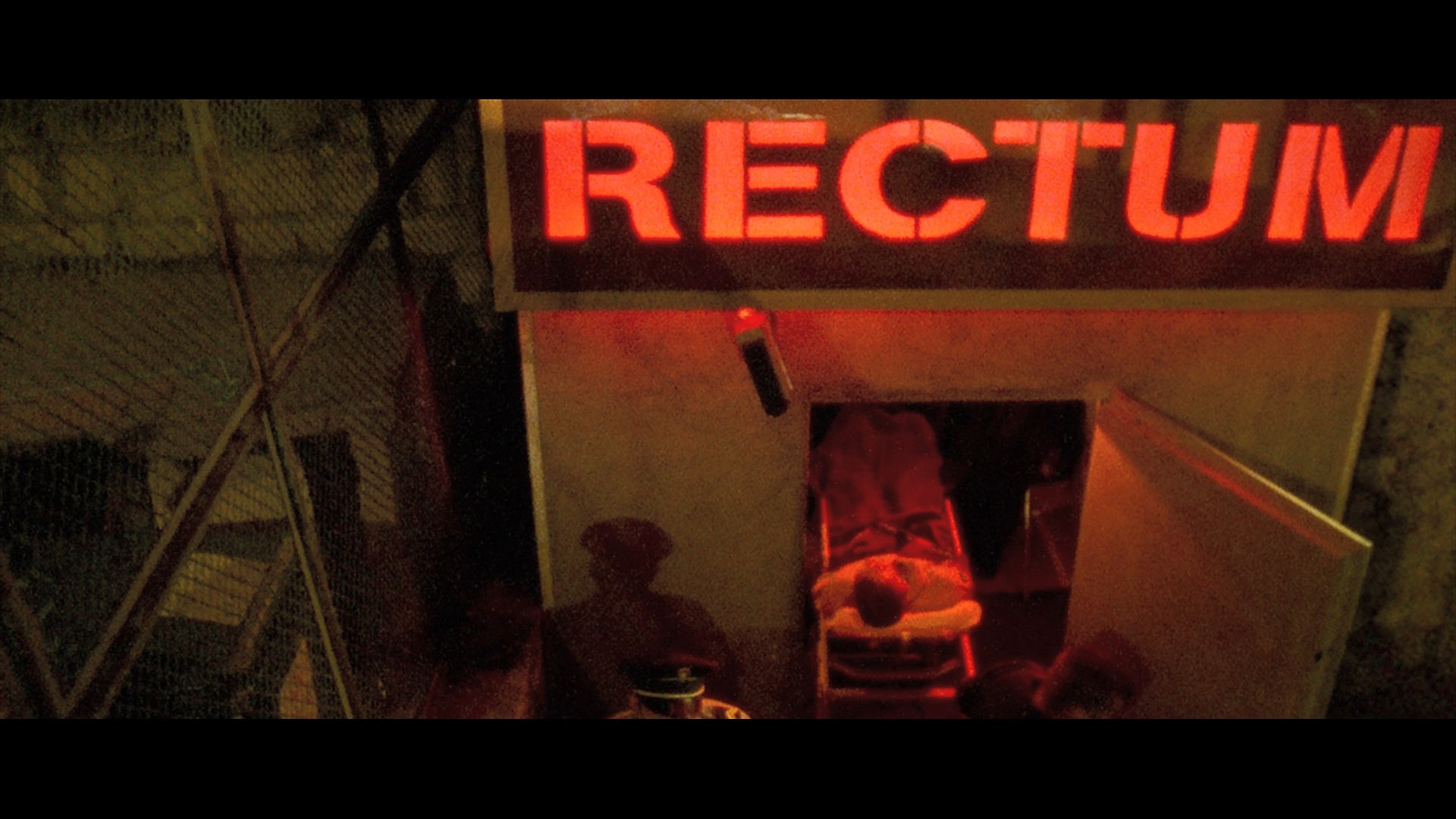 How and why these events unfolded and what the relationship really is between these three characters is also
How and why these events unfolded and what the relationship really is between these three characters is also 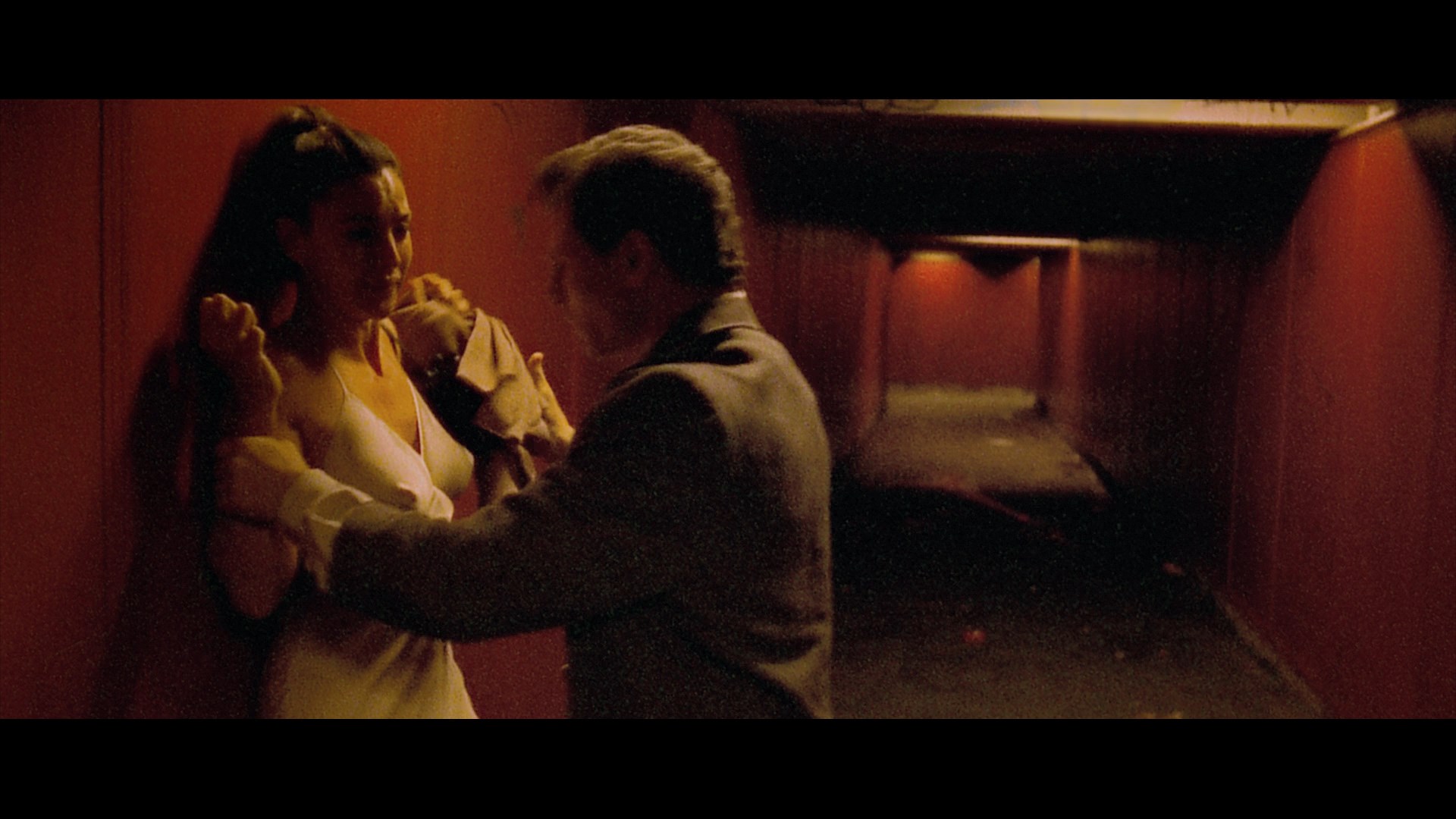 illuminated on the way to a conclusion offering equal doses of grace and endless sadness.
illuminated on the way to a conclusion offering equal doses of grace and endless sadness.
With its aggressive sound design (including an opening half-hour embedded with a distressing subliminal frequency supposedly employed by riot police) and vertiginous camerawork, Irreversible isn't exactly a film looking to be loved. However, if you now what you're getting into and are properly braced for its more ferocious elements, it's one of the most important and haunting entries in the New French Extremity movement that also spawned such grueling classics as Martyrs and Inside. The film's unflinching desire to shock the viewer in that opening act led to outraged reactions ranging from charges of homophobia to misogyny, which will obviously be up to the viewer's own personal tolerance levels but don't particularly hold up in the broader picture of Noé's work. If anything, it's simply full-on nihilistic as embodied by the sinister early line, "Time destroys all things," which could easily apply to the audience's defenses as well over the course of 97 minutes.
Never a particularly pretty film, Irreversible was shot in Super16, tweaked in post on 2K HD video, and then output to Super 35 to strike theatrical prints. Therefore it's a deliberately gritty, rough-looking experience, though the brighter scenes in the final stretch are actually quite lovely on their own terms. That means Blu-ray is about as good as it's going to get (unless someone decides to upscale it to 4K for some reason down the road a la Inland Empire), and the first English-friendly edition out of the gate from Indicator, a limited 10,000-unit double-disc edition, arrived in 2021 with a 2K restoration approved by the filmmaker. In 2019, Noé reassembled the film in chronological order as Irreversible: The Straight Cut, which unavoidably had to trim away some of those swirling backwards transitions to work as a coherent linear narrative (as well as one resonant bit with Bellucci); both cuts are presented here and look great under the circumstances, easily blowing away the various international DVD editions we've had over the years. The chronological cut is more of a curiosity than  anything (with a far less effective ending) and definitely isn't the way to watch this for the first time, but it's nice to have for obvious reasons and can sit on
anything (with a far less effective ending) and definitely isn't the way to watch this for the first time, but it's nice to have for obvious reasons and can sit on 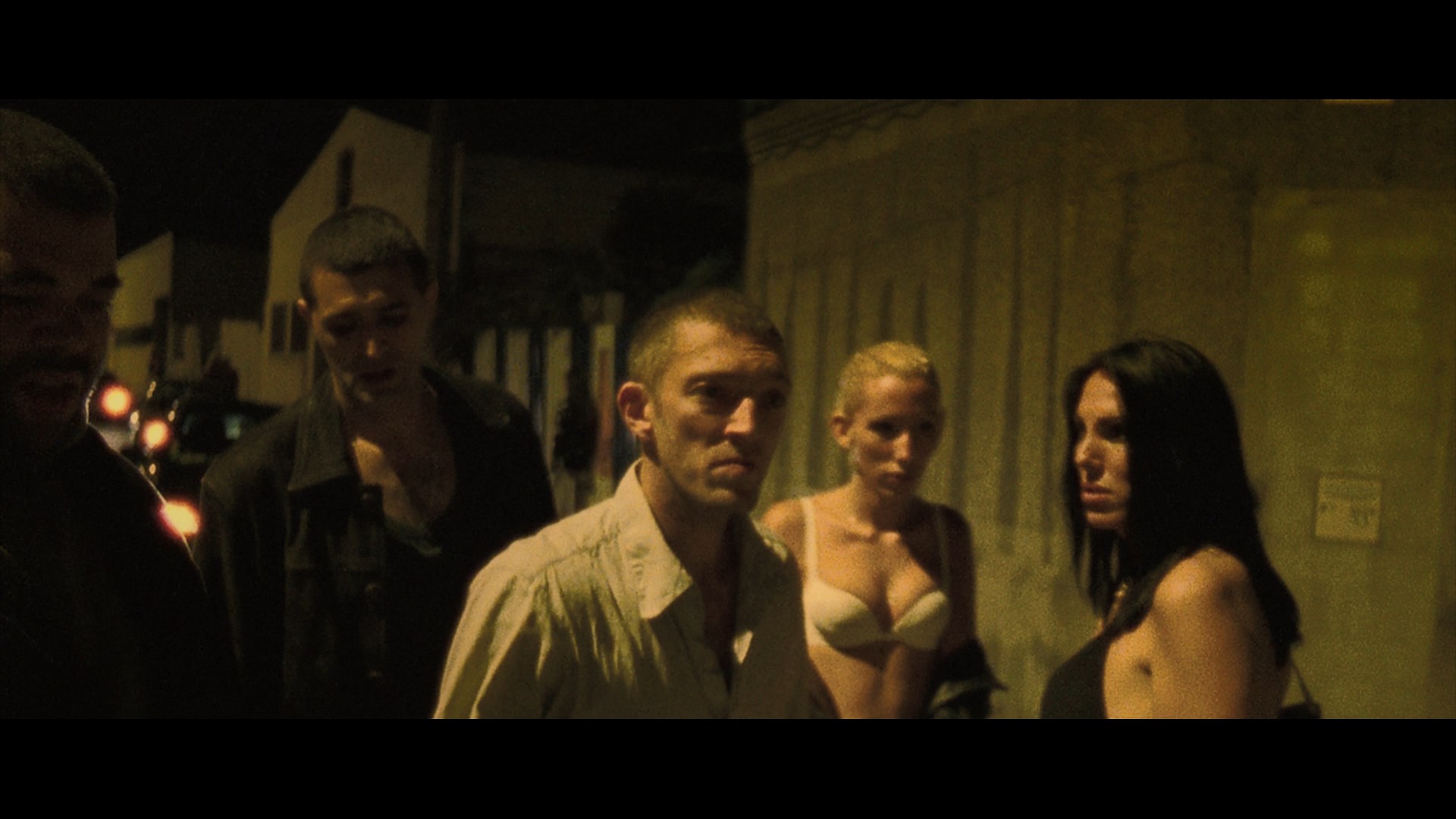 your shelf next to the special edition of Memento with its two timeline viewing options. The DTS-HD 5.1 and 2.0 stereo options are both as imposing as they always were here and nicely replicate the overwhelming aural experience offered in the theater, with optional, improved English subtitles provided. It's worth noting that the film actually has a very wide-ranging sound mix that calms down halfway through and has some welcome moments of genuine sonic pleasure, such as the warm use of Étienne Daho's infectious cover of "Mon Manège à Moi."
your shelf next to the special edition of Memento with its two timeline viewing options. The DTS-HD 5.1 and 2.0 stereo options are both as imposing as they always were here and nicely replicate the overwhelming aural experience offered in the theater, with optional, improved English subtitles provided. It's worth noting that the film actually has a very wide-ranging sound mix that calms down halfway through and has some welcome moments of genuine sonic pleasure, such as the warm use of Étienne Daho's infectious cover of "Mon Manège à Moi."
Disc one features the usual theatrical cut and almost all of the extras (apart from a 2019 Venice Film Festival trailer with the Straight Cut on disc two) including Noé's original audio commentary from 2003, which as expected is quite candid and packed with stories as he chats about the extreme (and technically illegal) tactics he used to achieve some of the swirling camera shots, the decision to leave the pivotal rape scene in Bellucci's artistic hands, and his experiences working with then real-life couple Cassel and Bellucci. The video extras (which feature heavy strobing imagery like the main feature, so approach with caution if that could be harmful) begin with 2019's "The Irreversible Odyssey" (43m20s) featuring Noé, Bellucci, Cassel, Dupontel, cinematographer Benoît Debie, and producers Vincent Maraval, Christophe Rossignon, and Richard Grandpierre among others charting the film's evolution from a pitch to Cassel (essentially as a response to Eyes Wide Shut and an earlier version of what became Love) into a much darker and more harrowing look at a romantic relationship than what was originally intended, with the general reversal concept inspired by Pinter's Betrayal despite a script running all of two pages. It's especially great seeing Bellucci and Cassel interviewed together here, swapping memories back and forth and chatting about the influences of things like Fritz Lang's M, and the film's reception is covered as well including the process of deciding whether or not to show it at Cannes (where 200+ people supposedly walked out early on).
An audio presentation of a 2002 NTF50 Q&A (49m7s) conducted by Hannah 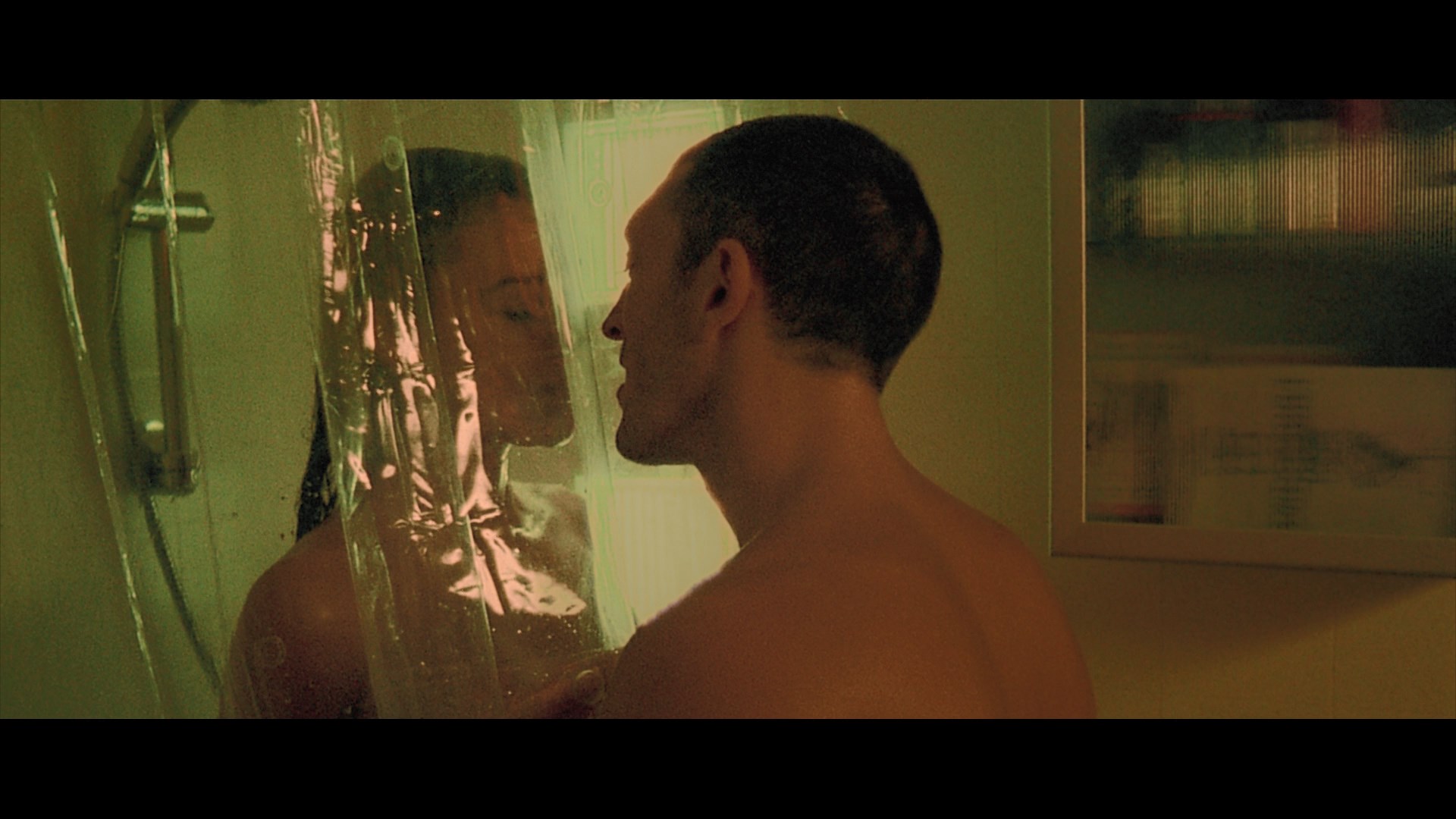 McGill at London's National Film Theatre features Noé, Bellucci and Cassel in conversation, overlapping quite a bit with the newer doc but offering a nice snapshot of the rapport between the stars and director at the time (as well as a longer, funnier discussion of the refusal to do a pornographic film). Another audio extra is 2009's "The BFI Masterclass with Gaspar Noé" (90m6s) with David Cox at London's BFI Southbank as part of the London Film Festival, which as expected is often hilarious and outrageous as he explains his approach to filmmaking, his disregard
McGill at London's National Film Theatre features Noé, Bellucci and Cassel in conversation, overlapping quite a bit with the newer doc but offering a nice snapshot of the rapport between the stars and director at the time (as well as a longer, funnier discussion of the refusal to do a pornographic film). Another audio extra is 2009's "The BFI Masterclass with Gaspar Noé" (90m6s) with David Cox at London's BFI Southbank as part of the London Film Festival, which as expected is often hilarious and outrageous as he explains his approach to filmmaking, his disregard 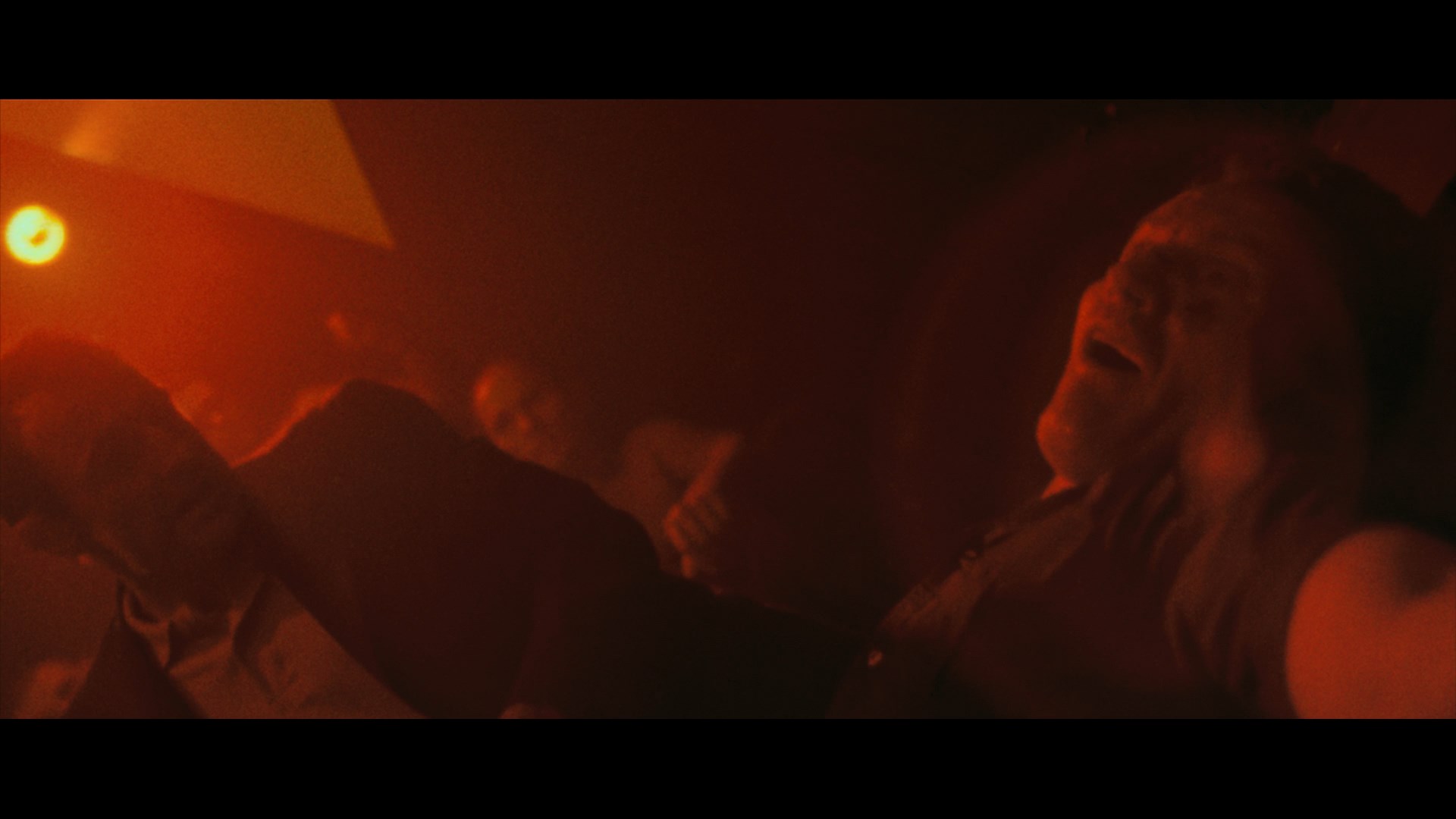 for audience satisfaction, his influences, and his approach to sound design. Ported over from earlier 2003 editions is "SFX" (7m28s) with visual effects supervisor Rodolphe Chabrier talking about the visual trickery employed in stitching together multiple camera shots from the rushes with reframing and digital manipulation used to tweak even the tiniest details. He also goes quite a bit into that fire extinguisher scene, which loses none of its impact even when you see here how it was achieved. In "Time Destroys All Things" (14m32s), Alexandra Heller-Nicholas analyzes the film's visual approach as a companion to the manipulation of time and ponders how it changes between the two cuts, followed by a quick 37s deleted scene in a hospital and two disorienting Noé-directed music videos for the film's composer, Thomas Bangalter (half of Daft Punk), "Stress" (4m43s) and "Outrage" (4m35s), culled from outtakes from the feature itself. Also included are six teasers, two U.K. trailers (uncut 18-certificate and censored 15-certificate), an image gallery of promotional and production shots, and Intoxication (5m9s), a 2002 Noé short with filmmaker Stéphane Drouot chatting in a kitchen in a stream-of-consciousness fashion about his process. The packaging also comes with a double-sided poster and a robust 80-page book featuring an essay by Anna Bogutskaya, an American Cinematographer article, a BBFC case study, sample critical reactions, an archival pro-and-con article by Nick James and Mark Kermode, and notes on the creation of the Straight Cut and Intoxication.
for audience satisfaction, his influences, and his approach to sound design. Ported over from earlier 2003 editions is "SFX" (7m28s) with visual effects supervisor Rodolphe Chabrier talking about the visual trickery employed in stitching together multiple camera shots from the rushes with reframing and digital manipulation used to tweak even the tiniest details. He also goes quite a bit into that fire extinguisher scene, which loses none of its impact even when you see here how it was achieved. In "Time Destroys All Things" (14m32s), Alexandra Heller-Nicholas analyzes the film's visual approach as a companion to the manipulation of time and ponders how it changes between the two cuts, followed by a quick 37s deleted scene in a hospital and two disorienting Noé-directed music videos for the film's composer, Thomas Bangalter (half of Daft Punk), "Stress" (4m43s) and "Outrage" (4m35s), culled from outtakes from the feature itself. Also included are six teasers, two U.K. trailers (uncut 18-certificate and censored 15-certificate), an image gallery of promotional and production shots, and Intoxication (5m9s), a 2002 Noé short with filmmaker Stéphane Drouot chatting in a kitchen in a stream-of-consciousness fashion about his process. The packaging also comes with a double-sided poster and a robust 80-page book featuring an essay by Anna Bogutskaya, an American Cinematographer article, a BBFC case study, sample critical reactions, an archival pro-and-con article by Nick James and Mark Kermode, and notes on the creation of the Straight Cut and Intoxication.
Two years later in 2023, Irreversible finally made its belated return to the U.S. with a two-disc Blu-ray edition from Altered Innocence. The theatrical cut is included on disc one with DTS-HD MA 5.1 and 2.0 audio options with English subtitles, plus "The Irreversible Odyssey," the Alexandra Heller-Nicholas video essay, the "SFX" featurette, the "Stress" and "Outrage" music videos, 3m16s of teaser trailers, and bonus trailers for The Wounded Man, After Blue (Dirty Paradise), Knife + Heart, and Arrebato. Disc two is devoted entirely to the straight cut of the film, also with 5.1 and 2.0 options and English subtitles. Image-wise this is from the same source, looking the same and showing off the film in the best showcase possible. It's worth noting that, as Altered Innocence explains, the film was shot and restored at 25fps: "To preserve the official runtime and the natural pitch of the frenetic audio for U.S. audiences we've encoded the film at 29.97fps progressively using a 2:2 pulldown method. No interlacing will be detectable as a result. We hope you enjoy!"
Updated review on May 15, 2023
![]()